
Brian Wilson Aldiss was an English writer, artist and anthology editor, best known for science fiction novels and short stories. His byline reads either Brian W. Aldiss or simply Brian Aldiss, except for occasional pseudonyms during the mid-1960s.
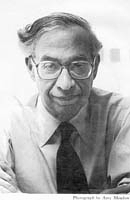
Donald Allen Wollheim was an American science fiction editor, publisher, writer, and fan. As an author, he published under his own name as well as under pseudonyms, including David Grinnell, Martin Pearson, and Darrell G. Raynor. A founding member of the Futurians, he was a leading influence on science fiction development and fandom in the 20th-century United States. Ursula K. Le Guin called Wollheim "the tough, reliable editor of Ace Books, in the Late Pulpalignean Era, 1966 and '67", which is when he published her first two novels in Ace Double editions.

Damon Francis Knight was an American science fiction author, editor, and critic. He is the author of "To Serve Man", a 1950 short story adapted for The Twilight Zone. He was married to fellow writer Kate Wilhelm.
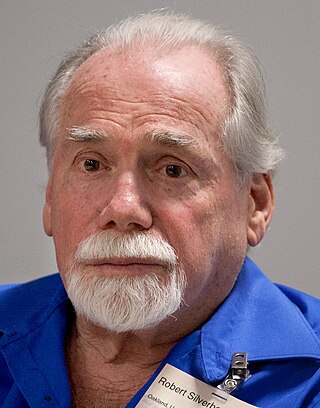
Robert Silverberg is an American author and editor, best known for writing science fiction. He is a multiple winner of both Hugo and Nebula Awards, a member of the Science Fiction and Fantasy Hall of Fame, and a Grand Master of SF. He has attended every Hugo Award ceremony since the inaugural event in 1953.
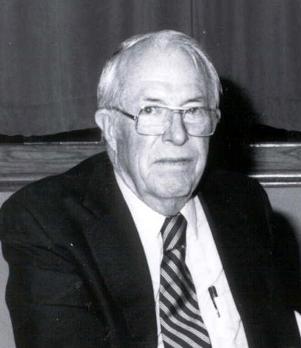
John Stewart Williamson, who wrote as Jack Williamson, was an American science fiction writer, one of several called the "Dean of Science Fiction". He is also credited with one of the first uses of the term genetic engineering. Early in his career he sometimes used the pseudonyms Will Stewart and Nils O. Sonderlund.

Daniel Francis Galouye was an American science fiction writer. During the 1950s and 1960s, he contributed novelettes and short stories to various digest size science fiction magazines, sometimes writing under the pseudonym Louis G. Daniels.

Earthlight is a science fiction novel by British writer Arthur C. Clarke, published in 1955. It is an expansion to novel length of a novella of the same name that he had published four years earlier.

Edwin Charles Tubb was a British writer of science fiction, fantasy and western novels. The author of over 140 novels and 230 short stories and novellas, Tubb is best known for The Dumarest Saga, an epic science-fiction saga set in the far future. Michael Moorcock wrote, "His reputation for fast-moving and colourful SF writing is unmatched by anyone in Britain."

The Sands of Mars is a science fiction novel by English writer Arthur C. Clarke. While he was already popular as a short story writer and as a magazine contributor, The Sands of Mars was also a prelude to Clarke's becoming one of the world's foremost writers of science fiction novels. The story was published in 1951, before humans had achieved space flight. It is set principally on the planet Mars, which has been settled by humans and is used essentially as a research establishment. The story setting is that Mars has been surveyed but not fully explored on the ground. The Sands of Mars was Clarke's first published novel.
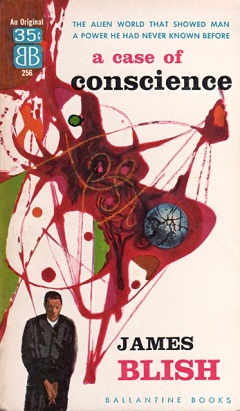
A Case of Conscience is a science fiction novel by American writer James Blish, first published in 1958. It is the story of a Jesuit who investigates an alien race that has no religion yet has a perfect, innate sense of morality, a situation which conflicts with Catholic teaching. The story was originally published as a novella in 1953, and later extended to novel-length, of which the first part is the original novella. The novel is the first part of Blish's thematic After Such Knowledge trilogy and was followed by Doctor Mirabilis and both Black Easter and The Day After Judgment.

The Body Snatchers is a science fiction horror novel by American writer Jack Finney, originally serialized in Collier's magazine in November–December 1954 and published in book form the following year.
This is a bibliography of works by Damon Knight.
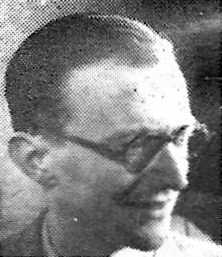
James Murdoch MacGregor was a Scottish journalist and author best known for writing science fiction under the pen name J.T. McIntosh.
The complete bibliography of Gordon R. Dickson.

To the Stars is a science fiction novel by American writer L. Ron Hubbard. The novel's story is set in a dystopian future, and chronicles the experiences of protagonist Alan Corday aboard a starship called the Hound of Heaven as he copes with the travails of time dilation from traveling at near light speed. Corday is kidnapped by the ship's captain and forced to become a member of their crew, and when he next returns to Earth his fiancée has aged and barely remembers him. He becomes accustomed to life aboard the ship, and when the captain dies Corday assumes command.
The following is a list of works by Arthur C. Clarke.
This article presents an incomplete list of short stories by Robert Sheckley, arranged alphabetically by title.

Masters of Evolution is a 1959 science fiction novel by American writer Damon Knight. It first appeared in 1954 in Galaxy Science Fiction as the novella "Natural State". Knight subsequently expanded the text by about 5000 words, and the longer version was published by Ace Books in 1959 as Masters of Evolution, in a dos-a-dos paperback that included George O. Smith's Fire in the Heavens.
This is an incomplete list of works by American space opera and science fiction author Frederik Pohl, including co-authored works.














